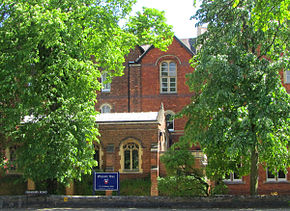Wycliffe Hall
| Wycliffe Hall | |
|---|---|
 |
|

Blazon: Gules, an open book proper the pages inscribed with the Latin words "Via Veritas Vita" in letters sable on a chief azure three crosses crosslet argent and in base an estoile or.
|
|
| University | University of Oxford |
| Location | 54 Banbury Road, Oxford |
| Coordinates | 51°45′47″N 1°15′36″W / 51.76302°N 1.260095°WCoordinates: 51°45′47″N 1°15′36″W / 51.76302°N 1.260095°W |
| Motto |
Via, Veritas, Vita "The Way, the Truth, the Life" (John 14:6) |
| Established | 1877 |
| Named for | John Wycliffe |
| Sister college | Ridley Hall, Cambridge |
| Principal | Michael Lloyd |
| Undergraduates | ~150 |
| Website | www |
| Map | |
Wycliffe Hall is a Church of England theological college and a Permanent Private Hall of the University of Oxford in the United Kingdom. The college is named after John Wycliffe, master of Balliol College, Oxford in the 14th century.
Founded in 1877, Wycliffe Hall provides theological training for candidates for ordained ministry in the Church of England as well as other Anglican and non-Anglican churches. The college also prepares people for lay ministry. There are also a number of independent and undergraduate students studying theology. It is rooted in the evangelical tradition of the Church of England.
Wycliffe Hall was founded in 1877 to train Christian workers as pastors and missionaries, especially as clergy within the Church of England and the wider Anglican Communion. It is one of more than 20 Anglican theological colleges established in England during the late 19th century. Its "sister college" is Ridley Hall, Cambridge, which opened in 1881. It was founded following evangelical public meetings in 1876 where the concerns were raised about how "the majority of clergy are professionally ignorant".
The college is named after John Wycliffe, master of Balliol College, Oxford, in the 14th century. He was a philosopher and theologian who argued for biblical theology. One of the founders of Wycliffe was J. C. Ryle, a Bishop of Liverpool and theologian.
For many centuries the University of Oxford was explicitly Christian and Anglican. It was officially secularised by the Oxford University Act 1854 and the Universities Tests Act 1871, when it was opened to students and lecturers of all religious faiths or none. Wycliffe Hall’s vision was to maintain the teaching of biblical and evangelical theology at Oxford. Its first pioneers aimed to promote "doctrinal truth and vital godliness". Its Victorian trust deed upholds the Thirty-Nine Articles of Religion, which is the part of the English Reformation heritage of the Church of England, although it now welcomes students from all Christian denominations. Since the 19th century the college has had close links with the Oxford Inter-Collegiate Christian Union and the Oxford Pastorate, two evangelical organisations working with Oxford students.
...
Wikipedia

